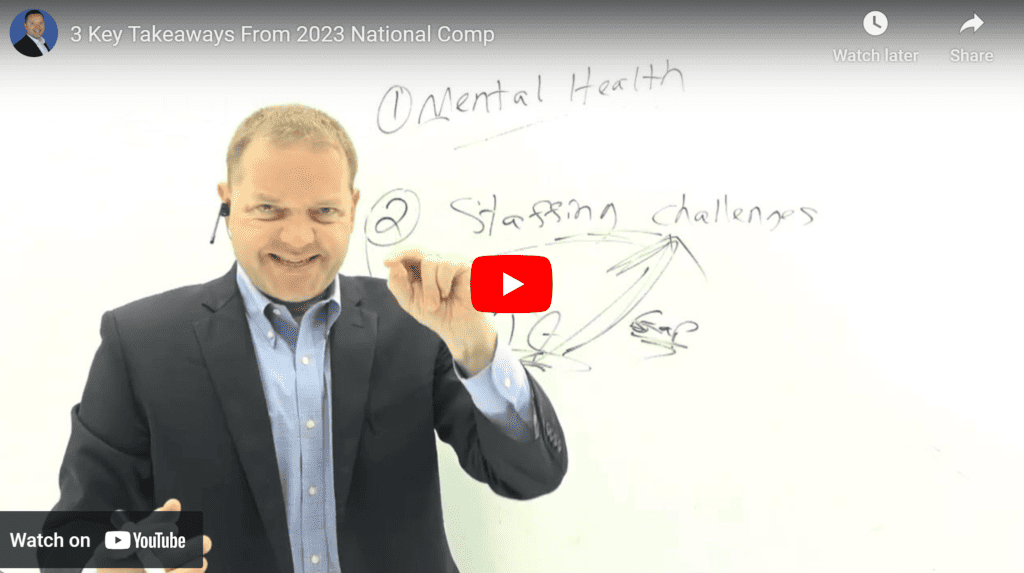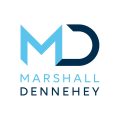There’s no more valuable time than we can come together as an industry to discuss trends and solutions. Hello, my name is Michael Stack. I’m the CEO of Amaxx. I recently attended the National Conference in Las Vegas. Always a great conference, always valuable to get together, see friends, see industry peers, see colleagues, meet new individuals, build new relationships, deep in existing relationships. Incredibly valuable.
3 Major Conference Themes
I want to talk about some of the major themes. What are people talking about? What is some of the industry chatter that’s going on? And share with you some of those themes that I pulled out just so even if you were there, if you weren’t there, maybe this matches up to what you pulled out. And if you weren’t there, just let you in on what’s going on in the industry. What are people talking about? What are some of the major themes of focus?
1 – Mental Health
First, major theme, talk about in several sessions, talked about in the opening keynote speech by Natasha Bowman, mental health, mental health. Key theme of the conference. Mental health. Talking about mental health. Natasha Bowman kicked off the keynote speech talking about the stigma of mental health, how she was diagnosed, bipolar in her forties, the impact on her life, the impact on her professional life, and how her mission is to get people to understand the stigma, get people to move past the stigma, get people to support those that are diagnosed and have mental health issues. Major, major theme pulled out from the conference and obviously going on in our world, in this post covid world, in our increasingly digital world and our increasingly huge amount of pressures on individuals, world mental health stood out as a major theme.
2 – Staffing Challenges
Theme number two, this is what I pulled out, talked about in several different sessions.
This idea of staffing, staffing and staffing challenges. I should put challenges on the end of this. Staffing challenges every company, municipalities, private sector, public sector, having challenges with staffing, staffing challenges. Huge common theme across many different sessions that I attended. Talking about it in terms of return to work, talking about in terms of hiring, talking about in terms of production, talking about in terms of demands, talking about in terms of how this impacts our overall mental health of those that are still in the workforce, that are trying to cover the increased demands that are put on them, staffing challenges.
3 – Artificial Intelligence
I want to talk about this and I want to talk about this third major point, and then we’ll pull this all together and how I think you can now make some improvements. Ai, artificial intelligence, ai. Just do the AI thing. Just do the AI thing.
Won’t that just fix everything? Just let the AI do it. What the heck does that even mean? A lot of people use this words and use this phraseology in terms of, Hey, just let the ai, we’ll just AI it up. Just do the AI thing. I don’t know what I’m talking about, but hopefully you do. When you’re talking about this word, ai, it’s used so commonly and so often misunderstood in our industry, in our industry, in our world, frankly, what it actually means and what it can do. Here’s where some of the solutions, so these are some of the challenges. Mental health challenges, staffing challenges. How do we use AI effectively in our world? Obviously, we know it’s coming. We know it’s this big thing. We know a certain percentage of people understand it. Most people don’t understand it, so let’s talk about how we’re using it.
Solving Staffing Challenges with AI
Here’s what some of the solution was. How can we automate even just using automation? How can we automate simple tasks that adjusters maybe we’re doing or other staffing challenges, low level tasks. What are they doing now that we can offload to a computer? This is a lot of kind of talk and chatter. How do we fill in this gap? There’s a big gap here with staffing. There’s a solution coming here with AI and computers and automation. How do we make our existing people a lot more efficient, a lot more effective in what they’re doing so that a lot of these remedial, repetitive tasks can be automated. They can be offloaded from the individuals and staffing. So how do we leverage this into our organization? How do we put process automation in place? How do we leverage these tools now to fill in some of these gaps?
When we talk about mental health and we talk about staffing challenges, again, think about this not in terms of AI is going to solve our mental health issues, but talk about systems. Talk about systems and processes, repeatable systems and processes to intentionally solve some of these issues. We’ve got staffing challenges. Can we fill in the gaps here? Can we put in systems in place to get us physically moving our physical health moving that’s going to support our mental health? Put different tools in place to leverage some other solutions, whether it’s AI or whether it’s simply expertise.
The Team Approach is the Solution
So great little story. I want to tell you from one of the sessions I attend, I’m just going to look at the name of it here. It was called Comorbid Health Conditions. Put Recovery, putting Recovery at Risk Mental Health, putting Recovery At Risk, great Session. It was kind of a funny session in terms of how it went through three panel speakers, three panel speakers.
The first panel speaker was talking about mental health in the workplace, and the question was, does mental health impact claims outcomes? So that’s the question. Does it impact claims outcomes? And without having attend the session, what is your answer? What is your guess? And the answer is obviously yes, in a massive, massive way. And he went through great presentation, great data, very scientific in terms of the data, but the bottom line of it was a massive, massive, yes, claims are hugely impacted by mental health, both in terms of outcome, in terms of duration, in terms of challenges, in terms of family challenges, in terms of all kinds of difficulties that come when mental health comorbidities are added to a claim. There’s three speakers in the speakers in the panel. Second speaker was from O D G. She talked about some of the clinical guidelines, some of the expertise.
Evidence-Based Medicine
It says, yes, we recognize this is a problem. Here’s what we’ve learned from evidence-based medicine evidence, evidence-based medicine evidence. What we know works. Here’s what we’ve learned, and here’s what is in our clinical guidelines within our O D G framework. Awesome. We have some expertise. We have a solution for this. We need to understand that it’s a problem. We need to understand this is a problem. This can help a solution. This is a problem. Here’s a solution. Leveraging some expertise, leveraging some evidence that people have already figured some of this stuff out and they’re continuing to improve upon it. And then the third speaker was Kathy Gallia from Paradigm. And what Paradigm does, if you’re not familiar with their organization, is they have developed an immense expertise in working with these very challenging cases. Paradigm came out of the history of the organization, came out of working with specializing, and they continue to do this today, and they expanded this product line.
Industry Expertise
They specializing in catastrophic care, traumatic brain injuries, very serious injuries, quadriplegic type injuries, these injuries that are extremely severe, developing that expertise. Huge, huge expertise in regards to how to deal with these extraordinarily difficult claims. Extraordinarily difficult claims that have mental health built into every one of them. Anxiety, depression, all this kind of stuff. Impact on the family. Every one of these claims, if it happened to you or me or any one of your family members would deal with all this stuff hugely, hugely heavy and difficult to work through. And they have an incredible expertise on it. So they’re talking about this stuff. Does mental health impact claims? Yes. Here’s O D G solution for evidence based medicine. It’s point number two. Point number three, Kathy Galley comes in paradigm and says, this is the results we’re seeing. This is how we’re doing it. We’re using social workers, we’re using caseworkers.
We’re using case managers. They’re working together as a team. It’s working incredibly well in these extraordinarily difficult cases. They’ve developed this immense expertise to deal with these challenges. Here’s the point, and here’s the takeaway. We need to understand what’s going on in our world. We need to understand mental health. We need to understand staffing challenges. We need to understand AI technology, various expertise within our industry. We need to know the challenges that we’re facing and bring in the right solutions. The challenges we’re facing bring in the right solutions because they exist. Because they exist, because they exist, they are in our industry. I talk so often about the team approach. It’s not that I, Michael Stack know how to deal with a quadriplegic or traumatic brain injury. I have no idea. That’s way beyond my expertise of how to actually properly navigate someone through that difficulty.
But the people at Paradigm know that Kathy Galia knows that they figured it out. They’re working through it. They have that expertise in it. Bring them in as part of the team and help solve that solution. Am I an AI expert? No way. Not an AI expert. Do I have some process, process automation expertise? Definitely. I definitely have some proud process automation. How do I work with and leverage some people that know this stuff? How do we fill in these gaps as we return to work? How do we now understand our challenges? Bringing the right solutions by tackling with the team approach? The principles are going to remain the same. The principles always, always remain the same. No matter what the challenges are, the challenges are going to change. The tactics are going to change. The challenges are going to change in our world. It continues to change very rapidly.
Tactics Change, Principles Do Not
The tactics specifically are going to change also very rapidly, but the principles will always, always remain the same. And that’s understand the challenge. Leverage the team approach for that solution and execute and implement. And when you do that, you’ll navigate challenges extremely, extremely well as they come up and as they change within our industry. Hope you could take these takeaways and actually use them in your organizations, your clients’, organizations, and see some results. Because remember, your work today and workers’ compensation can have a dramatic impact on your company’s bottom line, but it will have a dramatic impact on someone’s life. So be great.
Michael Stack, CEO of Amaxx LLC, is an expert in workers’ compensation cost containment systems and provides education, training, and consulting to help employers reduce their workers’ compensation costs by 20% to 50%. He is co-author of the #1 selling comprehensive training guide “Your Ultimate Guide to Mastering Workers’ Comp Costs: Reduce Costs 20% to 50%.” Stack is the creator of Injury Management Results (IMR) software and founder of Amaxx Workers’ Comp Training Center. WC Mastery Training teaching injury management best practices such as return to work, communication, claims best practices, medical management, and working with vendors. IMR software simplifies the implementation of these best practices for employers and ties results to a Critical Metrics Dashboard.
Contact: mstack@reduceyourworkerscomp.com.
Workers’ Comp Roundup Blog: http://blog.reduceyourworkerscomp.com/
©2023 Amaxx LLC. All rights reserved under International Copyright Law.
Do not use this information without independent verification. All state laws vary. You should consult with your insurance broker, attorney, or qualified professional.




